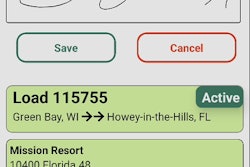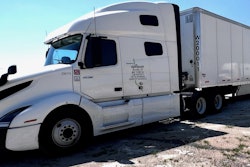American track-and-field athlete Carl Lewis won gold during a 1980s Olympic event in which he ran the 100-metre dash in 9.92 seconds. Fast forward to the 2024 summer Olympics, and the runner in last-place in the 100-metre dash was faster than Lewis at 9.91 seconds.
Trimble CEO Rob Painter compared the rapid acceleration of technology in the transportation industry to the Olympics.
[RELATED: Platform Science plans acquisition of Trimble's telematics business]
That’s “how fast the world moves, how fast the world's standards continually rise,” Painter said during the opening session of the Trimble Insight user conference held in Las Vegas this week. “So even if you're at the top of your game in one decade, one year, one moment, that might not be enough to keep you at the top the next year. Everyone around you is pushing themselves to be better, faster.”
He noted how the transportation industry has changed over time from ships and horse-drawn carriages to rail and modern trucks. We’re in the beginning of the next revolution, he said, which is embedded connectivity.
Just like in sports, Painter said each era transformed how the world works, and the world had to embrace that change. Trimble unveiled at Insight a range of new transportation technology to not only embrace that change but drive it.
“Change is happening faster than it's ever happened before,” Painter said. “We want to help drive transformation.”
Major product releases across Trimble’s range of connected transportation technology include updates to its carrier transportation management software, commercial navigation, asset maintenance, real-time visibility and DVIR solutions.
Trimble launched a cloud-based TMS order module that employs predictive analytics-based tender grading and dynamic area balance visualization for a TMS order workflow that optimizes while it executes.
The company also rolled out an update to the user interface of its commercial navigation solution, CoPilot, to make it more driver friendly. New features like predictive parking and trip planning optimize how drivers navigate their journeys, improving in-cab and back-office connection while enhancing fleet safety and efficiency.
TMT Fleet Maintenance has relaunched its Road Call module, providing maintenance managers a one-stop shop for managing vehicle breakdown maintenance needs. Maintenance managers can quickly spot disabled vehicles, find the best and closest service center and generate repair orders in a single, cloud-based user experience, saving time, reducing downtime and maximizing fleet efficiency.
Trimble also launched its Transporeon Visibility platform in North America, delivering real-time visibility and precise ETAs to in-transit shipments for all transportation types.
And finally, the company revealed its new Driver Vehicle Inspection Report (DVIR) solution for commercial fleets. Called Trimble Inspections and available through Trimble’s flagship telematics and fleet management software solution Trimble Instinct, it is designed to improve fleet safety and efficiency, promote regulatory compliance and simplify driver and back-office workflows.
New integrations
Trimble also announced several integrations during Insight.
Isaac Instruments has become the first external telematics platform to complete an integration through the Trimble Transportation Cloud (TTC) with the cloud-based Trimble Innovative Access Plus transportation management system.
Isaac has long integrated its solution with Trimble’s on-premise Innovative IES TMS through the Isaac Open Platform. This additional integration via the TTC provides fleets greater options for integrating different current and legacy versions of Innovative TMS to best fit their operations. It is the result of a multi-year cooperative effort between the companies to help fleets be better positioned for a connected future.
In addition, Trimble’s PC Miler (truck routing, mileage and mapping) is now integrated with Alvys’ TMS.
This integration is all-inclusive as part of the standard Alvys subscription, eliminating the need for separate contracts and renewals. PCMiler calculations help eliminate discrepancies in mileage reporting, leading to enhanced driver and customer satisfaction. It is particularly valuable when dealing with per-mile rates, ensuring fair compensation and billing practices.










